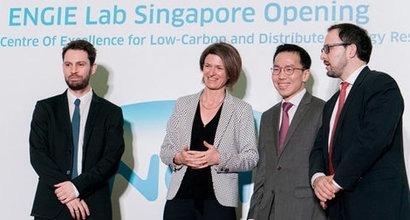
The new lab will act as a regional hub for energy innovation and technology in Southeast Asia and focuses on three fields: smart energy systems for cities and islands, industrial energy efficiency and gas technologies. It will support and collaborate with the Engie entities that are already established in the region, managing R&D projects and providing services based on its technological expertise which includes managing new energies, digital systems such as the Internet of Things (IoT) and mobile apps. It will also strengthen existing technologies to enhance energy-related infrastructures and energy uses.
Engie Lab Singapore is the latest addition to the strong international R&D network of the Group, which now includes 11 high-level research centres called “Engie Labs”, with a total of 1,100 researchers and experts, across all the continents. The Engie Labs worldwide ecosystem was established to bring new added-value to the fast changing global energy market and contribute actively to the innovation strategy of the Group.
“The opening of the Engie Lab Singapore is a key milestone of the development strategy of Engie in Southeast Asia to support the transition to low-carbon energy sources” said Isabelle Kocher, Engie Chief Executive Officer. “Singapore’s dynamic innovation ecosystem and regional connectivity provides the right environment for us to set up this leading-edge R&D centre to develop practical solutions to meet the energy challenges in the region, and will help businesses to maintain their technological excellence.”
Dr. Beh Swan Gin, Chairman, EDB, added that Engie’s decision to establish its first Asia-Pacific research centre in Singapore is testament to EDB’s strong base of capabilities that can enable companies to develop, test and commercialise innovative urban solutions to serve Asia and beyond. EDB is looking forward to Engie deepening its partnership with Singapore’s research institutes and universities to customise smart city and energy management solutions for the region.
Engie already has more than 1,600 employees in Singapore, involved in activities in power generation, energy services, energy trading, LNG and research. The formal opening of Engie Lab Singapore paves the way for further green energy developments in the region and further partnerships in the field of low-carbon technologies and innovation.
Engie Lab Singapore also offers high-level expertise on energy efficiency for industry. It will provide consulting services for optimizing industrial processes and help countries to reduce their industrial carbon footprint.
The opening of the lab follows two years of successful collaboration in the region. Since September 2014, Engie has developed a strong partnership with Nanyang Technological University (NTU) through its energy laboratory ERI@N. Both parties agreed to collaborate on various research and academic training topics and are working on new ways to lead the energy transition through a series of innovative projects. These include PowerZee, a gaming app involving students in efforts to reduce energy consumption on NTU campus; Renewable Energy Integration Demonstrator (REIDS) programme – the largest micro-grid demonstration platform in the tropics, and IoT open innovation challenge for the cities of tomorrow.
Engie develops its businesses (power, natural gas, and energy services) around a model based on responsible growth with the aim of taking on the major challenges of energy transition to a low-carbon economy, including access to sustainable energy, climate-change mitigation and adaptation, and the rational use of resources. The Group provides individuals, cities and businesses with highly efficient and innovative solutions largely based on its expertise in four key sectors: renewable energy, energy efficiency, liquefied natural gas and digital technology.
The group employs 154,950 people worldwide and achieved revenues of 69.9 billion euros in 2015. It is listed on the Paris and Brussels stock exchanges (ENGI) and is represented in the main international indices.
For additional information:

